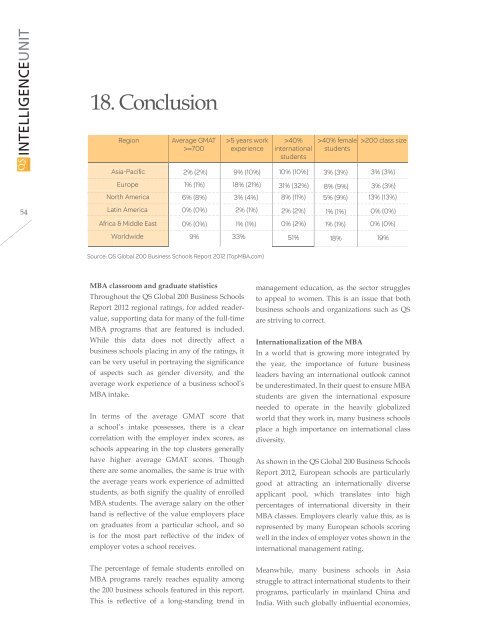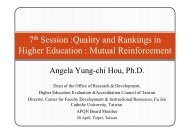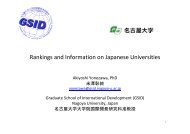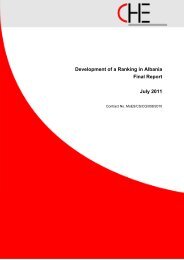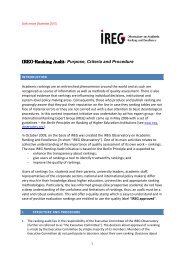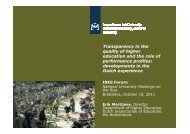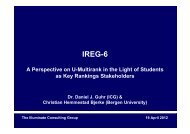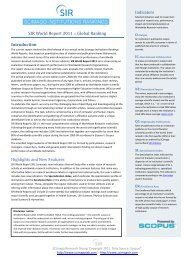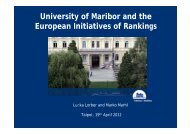QS Global 200 Business Schools Report 2012 - International ...
QS Global 200 Business Schools Report 2012 - International ...
QS Global 200 Business Schools Report 2012 - International ...
Create successful ePaper yourself
Turn your PDF publications into a flip-book with our unique Google optimized e-Paper software.
54<br />
18. Conclusion<br />
Region Average GMAT<br />
>=700<br />
Asia-Pacific<br />
Europe<br />
North America<br />
Latin America<br />
Africa & Middle East<br />
Worldwide<br />
2% (2%)<br />
1% (1%)<br />
6% (8%)<br />
0% (0%)<br />
0% (0%)<br />
9%<br />
>5 years work<br />
experience<br />
9% (10%)<br />
18% (21%)<br />
3% (4%)<br />
2% (1%)<br />
1% (1%)<br />
33%<br />
Source: <strong>QS</strong> <strong>Global</strong> <strong>200</strong> <strong>Business</strong> <strong>Schools</strong> <strong>Report</strong> <strong>2012</strong> (TopMBA.com)<br />
MBA classroom and graduate statistics<br />
Throughout the <strong>QS</strong> <strong>Global</strong> <strong>200</strong> <strong>Business</strong> <strong>Schools</strong><br />
<strong>Report</strong> <strong>2012</strong> regional ratings, for added readervalue,<br />
supporting data for many of the full-time<br />
MBA programs that are featured is included.<br />
While this data does not directly affect a<br />
business schools placing in any of the ratings, it<br />
can be very useful in portraying the significance<br />
of aspects such as gender diversity, and the<br />
average work experience of a business school’s<br />
MBA intake.<br />
In terms of the average GMAT score that<br />
a school’s intake possesses, there is a clear<br />
correlation with the employer index scores, as<br />
schools appearing in the top clusters generally<br />
have higher average GMAT scores. Though<br />
there are some anomalies, the same is true with<br />
the average years work experience of admitted<br />
students, as both signify the quality of enrolled<br />
MBA students. The average salary on the other<br />
hand is reflective of the value employers place<br />
on graduates from a particular school, and so<br />
is for the most part reflective of the index of<br />
employer votes a school receives.<br />
The percentage of female students enrolled on<br />
MBA programs rarely reaches equality among<br />
the <strong>200</strong> business schools featured in this report.<br />
This is reflective of a long-standing trend in<br />
>40%<br />
international<br />
students<br />
10% (10%)<br />
31% (32%)<br />
8% (11%)<br />
2% (2%)<br />
0% (2%)<br />
51%<br />
>40% female<br />
students<br />
3% (3%)<br />
8% (9%)<br />
5% (9%)<br />
1% (1%)<br />
1% (1%)<br />
18%<br />
><strong>200</strong> class size<br />
3% (3%)<br />
3% (3%)<br />
13% (13%)<br />
0% (0%)<br />
0% (0%)<br />
19%<br />
management education, as the sector struggles<br />
to appeal to women. This is an issue that both<br />
business schools and organizations such as <strong>QS</strong><br />
are striving to correct.<br />
<strong>International</strong>ization of the MBA<br />
In a world that is growing more integrated by<br />
the year, the importance of future business<br />
leaders having an international outlook cannot<br />
be underestimated. In their quest to ensure MBA<br />
students are given the international exposure<br />
needed to operate in the heavily globalized<br />
world that they work in, many business schools<br />
place a high importance on international class<br />
diversity.<br />
As shown in the <strong>QS</strong> <strong>Global</strong> <strong>200</strong> <strong>Business</strong> <strong>Schools</strong><br />
<strong>Report</strong> <strong>2012</strong>, European schools are particularly<br />
good at attracting an internationally diverse<br />
applicant pool, which translates into high<br />
percentages of international diversity in their<br />
MBA classes. Employers clearly value this, as is<br />
represented by many European schools scoring<br />
well in the index of employer votes shown in the<br />
international management rating.<br />
Meanwhile, many business schools in Asia<br />
struggle to attract international students to their<br />
programs, particularly in mainland China and<br />
India. With such globally influential economies,


